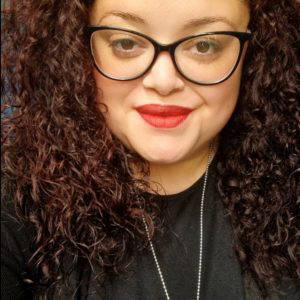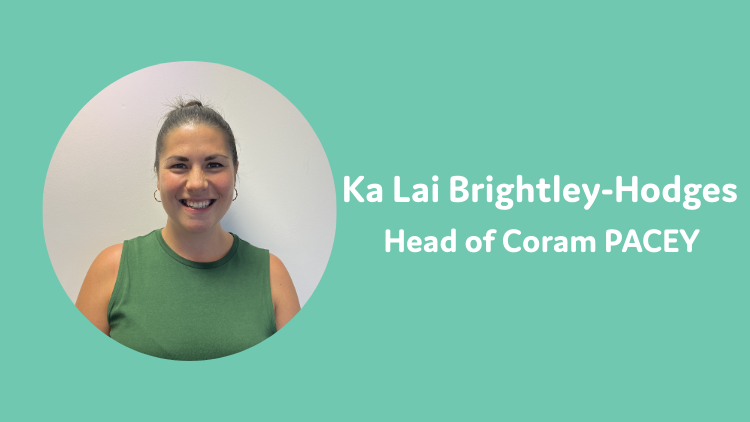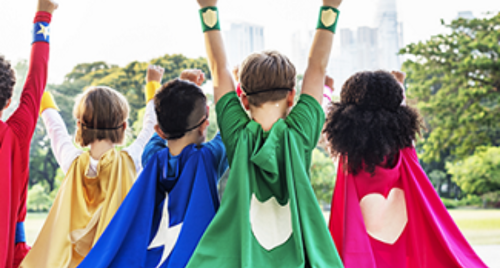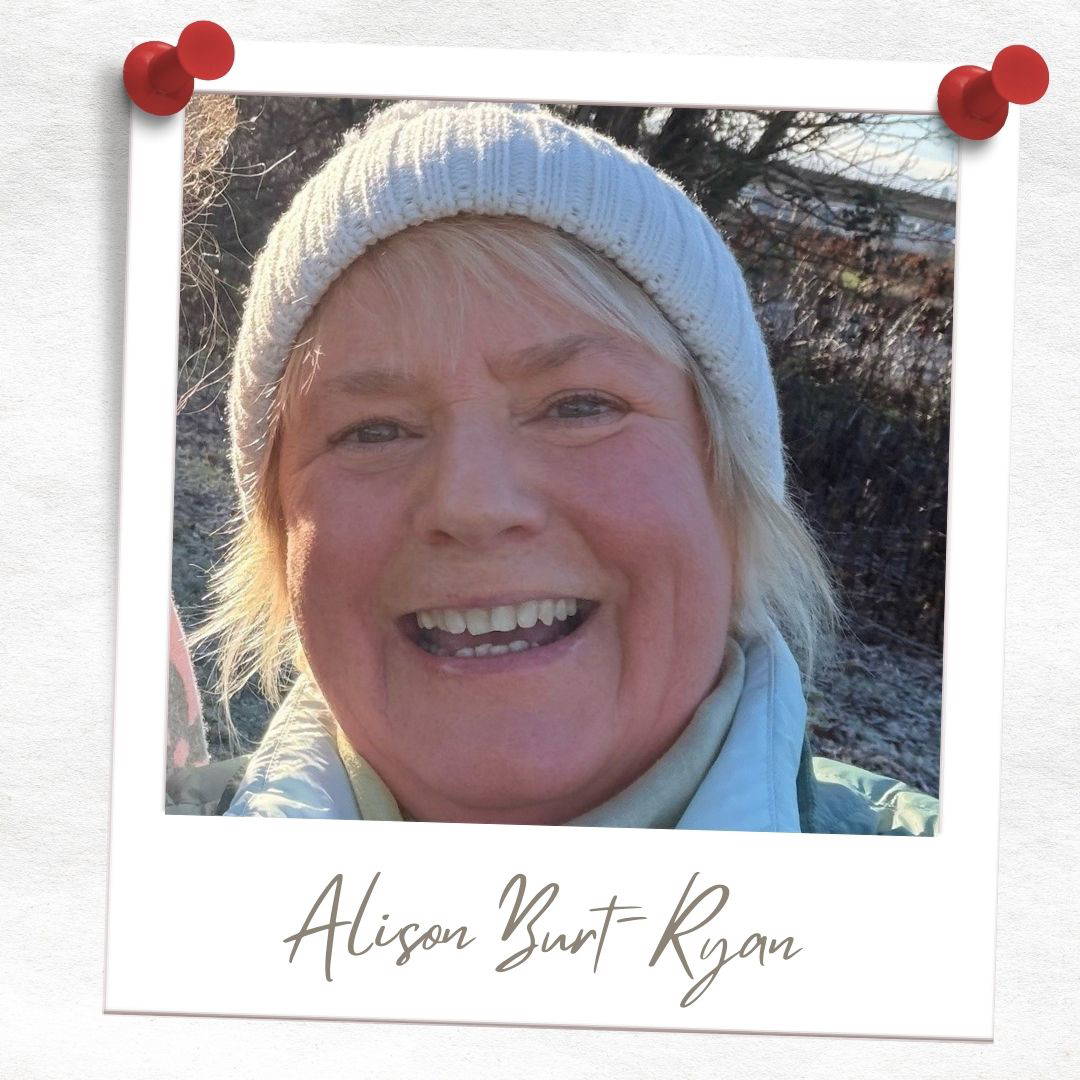An interview with Robyn Leckey, Commercial and Product Manager, Coram PACEY.
In this blog Coram PACEY Cymru spoke to Robyn who works for Coram PACEY in our head office in London to hear about her experiences, insights and thoughts on race, equality and diversity and supporting anti-racist practice.

Tell us about yourself
I was born in Croydon, Surrey and I’m of mixed heritage. My mum was born in Finchley, Tottenham and her parents were from Guyana. My Dad was born in Croydon too, and his parents were from Northern Ireland. My parents met at secondary school and have been together since they were 15 years old.
Singing’s a huge part of my life. Right now, I sing with four different choirs and I’ve had some amazing opportunities. I love every minute of it.
I’ve been with Coram PACEY for eight years now. I started out in Membership Services, then moved into a Commercial and Product Assistant role. Currently, I work as the Commercial and Product Manager.
Tell us about your own experiences of race
Being of dual ethnicity is complicated and often means you spend your childhood walking the line between cultures, identities, and expectations. For many, it comes with confusion or 'caught between worlds' moments: am I Black enough for this space? Will I get accepted into this predominantly White space? Do I need to prove that I'm not merely a "token" or a "special case" to either group? and, of course, I have sometimes experienced racism along the way. It’s not always easy to define, but it’s real. As someone who is of Black Caribbean British and White British heritage, I've always been proud of my dual heritage. My lighter skin may have shaped how others perceived me, but it never changed how I saw myself. I've always loved every part of who I am and feel comfortable, confident in my own skin. I am half Black and half White and I am me.
Being of dual ethnicity has made me more aware of how my racial identity is viewed differently depending on who I’m with. When I was younger in my late teens/early twenties and out with my Black friends and friends of dual heritage, we experienced being stopped by police and have been followed around stores by security, subtle yet clear reminders of racial profiling. We've been stopped when driving out and about for no apparent reason, and my friends asked to provide licence and insurance documentation and been questioned about our journey. However when I was with white friends, I did not have the same experiences. We were never stopped, questioned, followed around stores, or made to feel like we don't belong.
It's unsettling to realise that my treatment can shift so drastically based not on who I am but on who I'm seen with. These experiences have shown me just how deeply racial bias operates in everyday life and how proximity to whiteness can shield me from discrimination my Black friends and friends of dual heritage live with. The experience of bridging this gap has made me aware of the privilege and the prejudice intertwined in my own identity, of the uncomfortable place that dual heritage people often occupy, seen differently, treated differently, depending on context.
In school, I had been called a "White mixed-race girl" because of my appearance and because of how I spoke. I was also asked “why are you doing your hair like a white girl for?” when simply just styling and using the correct hair products for my hair texture.
Some people make comments or remarks to me about others which are prejudiced and racist, because they do not realise I am of mixed heritage myself, and think I will agree or sympathise with them which is uncomfortable and disheartening. Then there are those situations where, once people find out I'm of dual ethnicity, they would say things like, "But you're not like other Black people," or even just praise me for being "well spoken" or "very articulate." Even though these comments may be intended as "compliments", these suggestions are rooted in stereotypes and assumptions about races. Having skin that does not fit the typical mold of what some would consider a Black person, I have been treated as less threatening, more "acceptable," more "approachable". This has revealed how ignorant and biased some people are, and also reminds me of how blindly people judge others based on one's looks rather than really understand the complexity of identity or who those individuals are as people. On the other side, there have been times when I've been perceived to be "privileged" or "less Black" because of my skin tone, and even heard some say I don't have it "bad" because I'm lighter or "you don't understand what it's like to be Black". This creates a battle inside me; I identify as Black and White, but I'm always measured by the way I look and not my experiences. Racism doesn't always come in the form of hate-filled slurs; sometimes it's small, well-meaning comments that reinforce the idea you're not enough of either side to fit in.
There is beauty, too, in being of dual ethnicity. I think this access to more than one culture and tradition is a real treasure. That's the basis on which I bridge gaps, connect, and celebrate a richness that many people never get. It means that I see the world through multiple eyes: I can draw upon different cultural wisdoms and experiences.
Being of dual heritage doesn't mean I have to choose one side over the other. I am Black and White, and I can celebrate both of my heritages without feeling guilty or torn. I won't let racism from either side dictate who I am or where I belong. The sad thing is, it seems like it will be a long struggle to conquer racism, colourism, and prejudice, but until then, I will continue sharing my story and fighting for a world that will appreciate others for who they are as individuals, not just for the colour of their skin.
How do you think your own experiences influence your work with Coram PACEY?
Growing up being of dual heritage, I have always navigated between different cultures, and can honestly say, it has driven the way I work, especially in an office. I tend to look at things from a lot of angles. I love noticing what people bring to the table and that everyone thinks differently. Because I have spent so much time moving between these different worlds, inclusion just comes naturally for me. I care deeply about making people feel heard and respected, and trying to keep communication clear so nobody is left out. My background pushes me to bring people together and make the workplace a positive place where everybody feels they can do their best.
How do you think childminders should plan to promote equality, diversity and inclusive practice in their settings?
Childminders play a very important role in promoting equality, diversity, and inclusion by providing an environment where each child is welcomed and valued, using equipment and toys and activities that represent different cultures and abilities, adapting to each individual child's needs, challenging stereotyping in a gentle manner, and building caring relationships with each child to help them feel valued and supported.
What would be your top tips for supporting anti-racism practice in a childcare setting?
• Diverse representation: Include books, toys, posters, and activities representative of a variety of cultures and ethnicities.
• Inclusive curriculum : Celebrate cultures, traditions, and histories of all peoples in everyday learning.
• Address bias early: Challenge stereotypes and biased language immediately and in a constructive manner.
• Family engagement: Work with families from various backgrounds and respect their respective cultures.
• Staff training: Provide all staff with regular anti-racism and cultural competence training.
• Model respect: Demonstrate inclusive language, behaviours, and attitudes at all times.
• Safe conversations – Encourage children to raise questions about differences in a supportive manner.
• Policy and practice: Embed the principles of anti-racism into all policies, routines, and disciplinary practices.
Further information
- Coram PACEY Spotlight: Anti-racist Wales
- DARPL: Anti-racist training in Wales
- NEWS: Publication of Anti-racist Wales Action Plan / Cynllun Gweithredu Cymru Wrth-hiliaeth
- Coram PACEY Blog: Diversity, Inclusion and Equality
- Coram PACEY Blog: Diversity, Inclusion and Equality. What this means to me
- Coram PACEY Blog: Talking about race in the early years
- Coram PACEY Spotlight: Promoting positive diversity
- Mind: Racism and mental health



